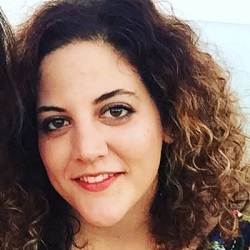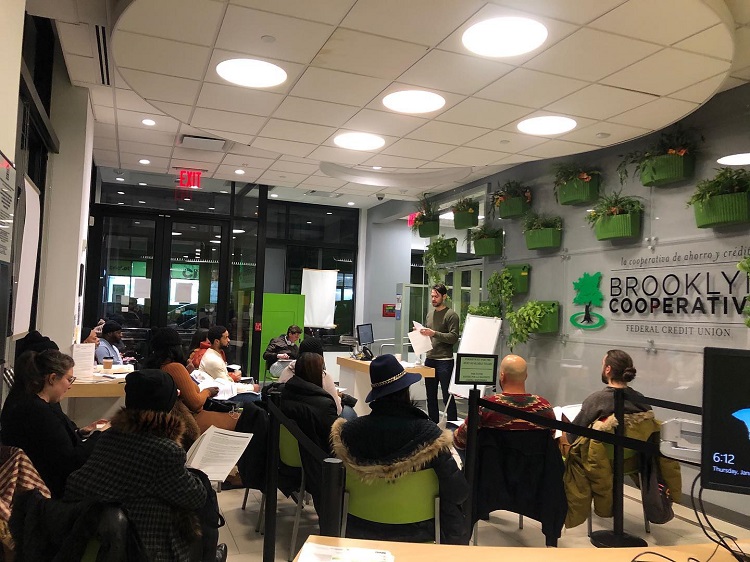
Azra Samiee, Assistant Director Of Marketing & Outreach, Brooklyn Cooperative FCU
Azra Samiee is the assistant director of marketing and outreach for Brooklyn Cooperative Federal Credit Union ($39.8M, Brooklyn, NY), a position she has heldsince August 2018.
Founded in 2001, Brooklyn Cooperative’s mission is to further wealth-building opportunity and resilience among members. The credit union operates two branches in the Bushwick and Bedford-Stuyvesant neighborhoods of Brooklyn, home to approximately300,000 residents 85% of whom are minorities. In the past three years, the credit union has received $1,488,750 in grants from the CDFI Fund, the NCUA Technical Assistance program, and other foundations and development programs.
What populations do you serve?
Azra Samiee: We were founded in 2001 in response to a growing need within the Bushwick and Bedford-Stuyvesant communities. Our community includes predominately Black and brown working-class people, including many small business owners,who haven’t had access to loans in the past. Our members are primarily Hispanic and Spanish speaking.
What do these populations need from a financial institution?
AS: This is a corridor in central Brooklyn that has a small number of financial institutions. Those larger institutions that do operate in this area have historically excluded the populations we aim to serve, who need access to accessibleand affordable savings and checking accounts, personal or mortgage loans, or capital to start or expand their small business.
CU QUICK FACTS
Brooklyn Cooperative FCU
Data as of 06.30.20
HQ: Brooklyn, NY
ASSETS: $39.8M
MEMBERS: 7,396
BRANCHES: 2
12-MO SHARE GROWTH: 44.1%
12-MO LOAN GROWTH: 35.1%
ROA: 1.61%
When did Brooklyn Cooperative become a CDFI? Why?
AS: We became CDFI-certified in 2001. With the certification, our services are more accessible and we’re able to join a network of other institutions we can learn from and work with. It creates access and helps us build programsthat serve small businesses.
How competitive is the grant process? How do you stand out from other applicants?
AS: Grants have become extremely competitive. Over the years, the pool for CDFI funding has grown and the number of applications has grown with it, with CDFIs focused on affordable housing and small businesses, among others. More recently,corporate funders are allocating funds to CDFIs. Their funding mandates we be a nonprofit, but they aren’t completely familiar with the wide work we accomplish. We’re a 501(c)(1), which is an IRS-recognized nonprofit organization, butoften the work to submit an application for funding through these entities is discouraging because it takes us away from what we are trying to accomplish.
We stand out in our applications by highlighting and discussing our geography and that, as a CDFI, we serve neighborhoods and people who have been historically marginalized. We are also the third-largest, and only community-based, credit union in Brooklyn.
We distinguish ourselves by pointing to our longevity and ability to respond to immediate local needs. We are familiar with our community and have rapport with our members and borrowers. Brooklyn Cooperative’s practices are centered in ensuringeconomic equity for traditionally marginalized communities including people of color, people from working class backgrounds, women, and LGBTQ populations. This is reflected in both our membership and our staff.
If you’re not going to accommodate the needs of your community, what’s the point of having the certification?
Who or what is historically the aim of your community work? What challenges do you look to address? Why?
AS: We have made a concerted effort in the past year to ensure we are democratizing the ways in which our members are able to participate in the credit union, so we’ve been hosting town halls where members have the opportunity tospeak directly with us on a variety of topics they’ve chosen. We also offer a number of free workshops for members, one of the most popular is our small business tax prep service.
We are one of the only SBA lenders in our area, which was particularly valuable in April when the CARES Act was passed and we saw an influx in Paycheck Protection Program loans. As an SBA lender, it opened the door for us to help people who were new tocommunity credit unions.
Brooklyn Cooperative also operates an affiliate nonprofit called Grow Brooklyn, which has offered technical services that complement the credit union’s financial services since 2008. We advocate for policies that address generations of economicinjustice experienced in our communities.
This is not an abstract idea. Across New York City, only Grow Brooklyn’s attorneys provide end-of-life planning and estate services to homeowners two-third of whom are Black or brown whose title to their properties are in legal jeopardy.Only Brooklyn Cooperative’s tax preparers counsel entrepreneurs on compliant tax practices, prepare, and then file the tax returns as required to protect these businesses from penalties that could shut them down. Across the nation, Grow Brooklynstands out for a tax prep program it has scaled from 72 annual returns to 7,200 while prioritizing the delivery earned income tax credits (EITC) back to our neighborhoods 33% of Grow Brooklyn’s tax clients receive EITC.
How has COVID-19 changed your operations or your community work?
AS: In March, we were uncertain how COVID-19 would affect our daily operations. Other large banks in our community closed, but we remained open. We modified our hours and streamlined our online processes so our at-risk populations couldaccess their accounts and information remotely. The same was true for our staff. We relied heavily on our IT team to build out the ability to work from home as necessary.

A full house attends Brooklyn Cooperative’s getting ahead financial counseling class from January. The credit union offers these classes monthly in partnership with New York City-based Neighborhood Trust FCU.
As I mentioned, we received a large number of PPP loan applications. Many of those who applied had already been excluded from other financial institutions because they didn’t have an existing account or the bank made it difficult to access the funds.We created a high-touch experience for anyone who applied for PPP funding through our organization. And while we worked to respond to the needs of our own membership, we made sure the next level of applicants could access funds, too. We funded morethan $6 million in loans.
How has COVID-19 changed the way you think about the credit union and its mission? How have you evolved?
AS: It has encouraged us to think about how people are able to access our programs and re-emphasized why we exist and why we are an essential service within our community. Going forward, we need to continue to communicate with our memberson the various channels they can use. Being accessible and offering needed solutions is important.
Why are CDFI-certified credit unions important to the financial services landscape?
AS: CDFIs create access. They have strong footholds within their communities and their commitment to the historically underserved is important. If you ask the question, what if CDFIs like us didn’t exist, it wouldbe hard to imagine. How many more small businesses or individuals would be in far worse economic positions?
What lessons or advice do you have for credit unions considering CDFI certification?
AS: Don’t let the tail wag the dog. It’s important institutions create programs that speak to the needs of their community rather than thinking what they offer will do. Many of the programs we’ve created were in directresponse to a need. It’s important to understand the needs of your community and have your services and programs reflect those. If you’re not going to accommodate the needs of your community, what’s the point of having the certification?
This interview has been edited and condensed.